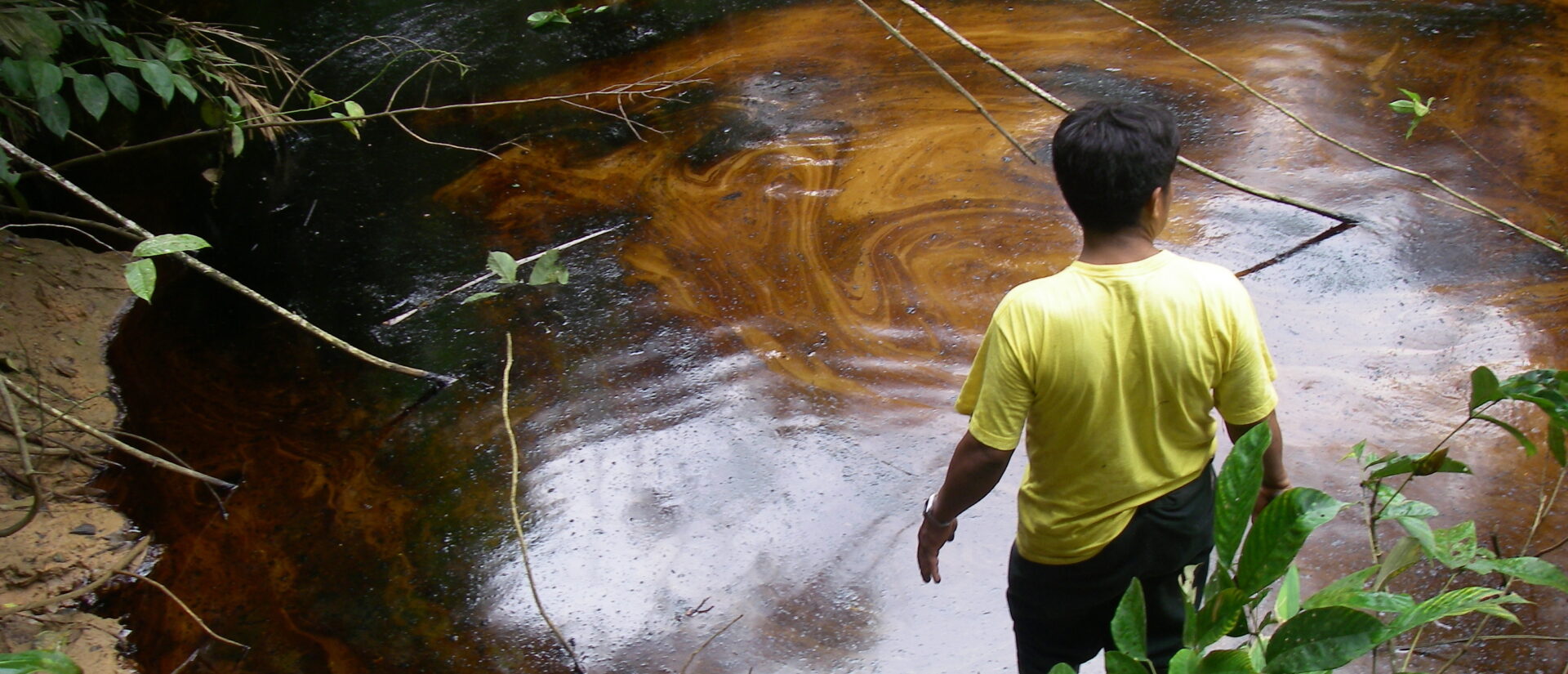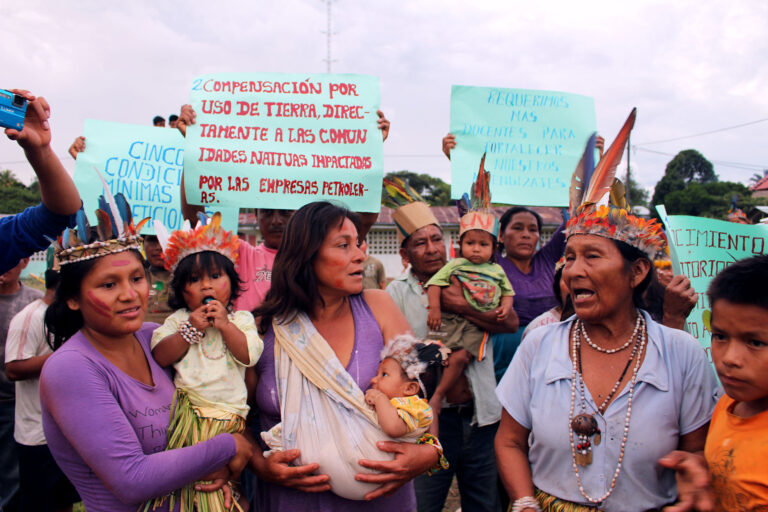
Complaint against “Dutch” oil company Pluspetrol for violation of OECD guidelines
On 11 March 2020, indigenous leaders from Peru filed a complaint against oil company Pluspetrol to the National Contact Point for the OECD guidelines, supported by, amongst others, SOMO and Oxfam Novib. Originally an Argentinian company with its headquarters in Amsterdam via a “letterbox construction”, it has allegedly caused severe environmental pollution, violating the rights of indigenous people in the Peruvian Amazon. According to the complaint, Pluspetrol also acts contrary to OECD provisions on taxation and transparency because its Dutch office has set up fiscal constructions that make tax avoidance possible.
Complaint against “Dutch” oil company Pluspetrol for violation of OECD guidelines
Oil extraction by Pluspetrol has led to large-scale pollution of the habitat of the indigenous Achuar, Kichwa, Kukama, and Quechua communities in northern Peru. For fifteen years, Pluspetrol contaminated nearly two thousand different locations in the Amazon. Pluspetrol’s operations in the area ended in 2015, but instead of cleaning up the pollution and compensating the local population, the oil company refuses to clean up.
Video by ‘If not us then who’, shot in March 2020.
Pluspetrol’s activities resulted in numerous fines for the company from the Peruvian authorities for violating environmental laws. For example, the oil company discharged huge amounts of toxic waste water for years and allowed overdue maintenance on the outdated installations and pipelines that caused many oil leaks. Toxic substances such as cadmium, barium, and lead, contaminated soil, rivers and groundwater. This has disastrous consequences for the fish and game stock, drinking water quality and biodiversity in the area and thus the food supply of the indigenous population.
“We have come to the Netherlands seeking justice because there is nowhere else to go,” said Aurelio Chino, president of FEDIQUEP, an organisation that represents the Quechua communities from the Pastaza River. “In our own country, we were called terrorists when our only option was to pick up our spears to protest against the tainting of our rivers, our land, our fish and our animals. We hope that here we will be treated like human beings and that the Dutch government can convince Pluspetrol to take responsibility for the terrible harm the oil industry has done to our peoples.”
The large-scale pollution is associated with serious health problems in nearby communities, such as high levels of cadmium and other heavy metals in the blood, miscarriages, diarrhoea and skin diseases. Imke Greven (Oxfam Novib): “Pluspetrol has to clean up its mess after fifteen years of drilling for oil. The health of the people there has been under threat for years and their land rights are being pushed aside. Pluspetrol has to take human rights seriously and do something about it. Oxfam will continue to support the indigenous people in this struggle.”
Fiscal construction via the Netherlands
In addition to violations of the OECD guidelines on the environment and human rights in Peru, Pluspetrol also acts in violation of the OECD guidelines on taxation and transparency. Pluspetrol’s head office is officially established in the Netherlands through a letterbox company in Amsterdam. According to the complainants, the letterbox construction is the hub in a complex, opaque international corporate structure with numerous branches in tax havens. This has allowed the company to avoid tax on the profits it made with its polluting oil extraction in Peru. The fiscal structure of the company makes it possible, via Luxembourg, to pass on profits from the Netherlands to the Bahamas.
“The structure that Pluspetrol has set up is typical of the formulation that companies create in order to avoid as much tax as possible,” says SOMO researcher Jasper van Teeffelen. “The Netherlands plays a central role in the tax tricks box of multinationals of this kind. Precisely because of the impact Pluspetrol has on people and the environment in the Amazon, it is very important that the Dutch government puts an end to these tax constructions and takes action against the company”.
OECD Guidelines
The OECD Guidelines for Multinational Enterprises(opens in new window) make clear what the governments of the OECD countries, including the Netherlands, expect from internationally operating companies in the field of corporate social responsibility. Among other things, the OECD considers it important that companies report how they comply with these guidelines. With their complaint, the indigenous leaders, and co-complainants SOMO, Oxfam Novib, Oxfam Peru and Equidad Peru ask the National Contact Point (NCP) of the OECD in The Hague to examine Pluspetrol’s social policy and to mediate between the communities and the company so that the company takes its responsibility and cleans up the pollution in the rainforest.
Following an investigation by the NCP in 2019, Minister Kaag (Foreign Trade and Development Cooperation) urged the Dutch oil and gas sector to come up with an action plan to improve compliance with the OECD guidelines by the first quarter of 2020. This complaint clearly shows that policymakers need to do more to bring the activities of oil and gas companies into line with international standards for responsible business. In February 2020, the NCP ruled that Shell also acted in violation of the OECD guidelines in Nigeria.
Meeting in Nieuwspoort and public debate
On Wednesday 11 March, the delegation from Peru met with members of the Lower House about this complaint in Nieuwspoort(opens in new window) , The Hague. On Thursday 12 March Oxfam Novib and SOMO organised a public debate(opens in new window) in the Humanity House in The Hague about the case with the delegation from Peru.
Partners
-
Oxfam Peru
-
Equidad Peru
-
PUINAMUDT
Do you need more information?
-

Joseph Wilde-Ramsing
Advocacy Director
Related content
-

-
 CSDDD Datahub reveals law covers fewer than 3,400 EU-based corporate groupsPosted in category:News
CSDDD Datahub reveals law covers fewer than 3,400 EU-based corporate groupsPosted in category:News David Ollivier de LethPublished on:
David Ollivier de LethPublished on: -
 Additional evidence filed against Booking.com for profiting from illegal settlementsPosted in category:News
Additional evidence filed against Booking.com for profiting from illegal settlementsPosted in category:News Lydia de LeeuwPublished on:
Lydia de LeeuwPublished on:




